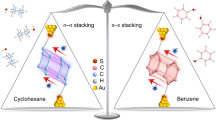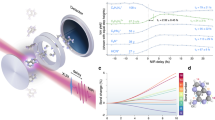Abstract
POINT charges located at the atom centres of conjugated molecules can be calculated using the Del Re procedure for σ electrons, the Hückel procedure for π electrons and the principle of σ–π additivity. Such point charges, calculated by this and other procedures, have been used in biophysical problems1–4. Can the very simple Del Re—Hückel procedure give reasonable values for the charges ? This report provides a partial answer by comparing observed dipole moments with those calculated from Del Re–Hückel charges obtained with established sets of the necessary parameters5,6.
This is a preview of subscription content, access via your institution
Access options
Subscribe to this journal
Receive 51 print issues and online access
$199.00 per year
only $3.90 per issue
Buy this article
- Purchase on SpringerLink
- Instant access to full article PDF
Prices may be subject to local taxes which are calculated during checkout
Similar content being viewed by others
References
Bradley, D. F., Lifson, S., and Honig, B., Electronic Aspects of Biochemistry (edit. by Pullman, B.), 77 (Academic Press, 1964).
Nash, H. A., and Bradley, D. F., Biopolymers, 3, 261 (1965).
Nash, H. A., and Bradley, D. F., J. Chem. Phys., 45, 1380 (1966).
Bradley, D. F., and Nash, H. A., Molecular Associations in Biology (edit. by Pullman, B.), 137 (Academic Press, 1968).
Del Re, G., J. Chem. Soc., 4031 (1968).
Streiwieser, jun., A., Molecular Orbital Theory for Organic Chemists (Wiley, 1961).
Sutton, L. E., Tables of Interatomic Distances and Configurations in Molecules and Ions, Special Publication No. 18 of The Chemical Society, London (1965).
McClellan, A. L., Tables of Experimental Dipole Moments (W. H. Freeman, San Francisco, 1963).
Kivelson, D., Wilson, jun., E. B., and Lide, jun., D. R., J. Chem. Phys., 32, 205 (1960).
Mirri, A. M., Guarnieri, A., and Favero, P., N. Cimento, 19, 1189 (1961).
Kilb, R. W., Lin, C. C., and Wilson, jun., E. B., J. Chem. Phys., 26, 1695 (1957).
Wagner, R., Fine, J., Simmons, J. W., and Goldstein, J. H., J. Chem. Phys., 26, 634 (1957).
Lerner, R. G., Dailey, B. P., and Friend, J. P., J. Chem. Phys., 26, 680 (1957).
Erlandsson, G., and Selen, H., Ark. Fys., 14, 61 (1958).
Del Re, G., Electronic Aspects of Biochemistry (edit. by Pullman, B.), 221 (Academic Press, 1964).
Coulson, C. A., Trans. Farad. Soc., 42, 106 (1964).
Berthier, G., Pullman, B., and Pontis, J., J. Chim. Phys., 49, 367 (1952).
Goodwin, T. H., J. Chem. Soc., 1684 (1955).
DeVoe, H. J., and Tinoco, jun., I., J. Mol. Biol., 4, 500 (1962).
Kier, L. B., Tetrahedron Lett., 37, 3273 (1965).
Berthod, H., and Pullman, A., J. Chim. Phys., 62, 942 (1965).
Author information
Authors and Affiliations
Rights and permissions
About this article
Cite this article
NASH, H., GROSSMAN, S. & BRADLEY, D. Charge Distributions of Conjugated Molecules. Nature 219, 370 (1968). https://doi.org/10.1038/219370a0
Received:
Published:
Issue date:
DOI: https://doi.org/10.1038/219370a0



